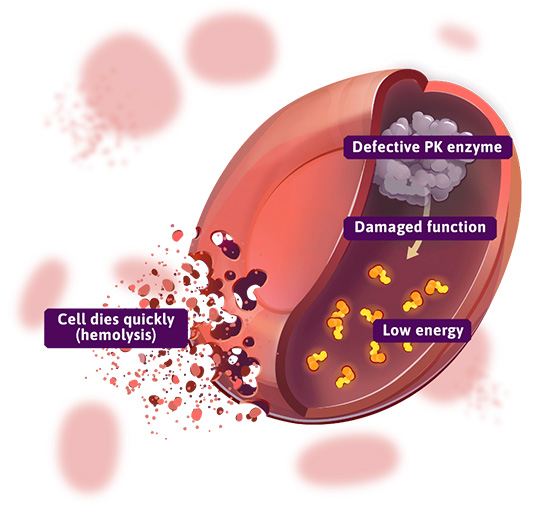
What is PK deficiency?
Understand the role that the PK
enzyme plays in your red blood cells
About PK deficiency
Pyruvate kinase (PK) deficiency is a rare, inherited enzyme defect that causes red blood cells (RBCs) to break down faster than they are made, which leads to lifelong hemolytic anemia.
The life of healthy RBCs
- After healthy RBCs are produced, they travel through the lungs, where oxygen binds to a molecule in each of the RBCs called hemoglobin
- The RBCs then transport oxygen to the rest of the body
- Healthy RBCs have enough ATP, or energy, made by the pyruvate kinase R (PKR) enzyme to survive this trip throughout the body
- Each RBC lives for about 120 days before being broken down and removed from circulation
PK deficient RBCs

- People with PK deficiency have a PK enzyme that has a defect, causing their RBCs to break down sooner than normal. When RBCs break down, it’s called hemolysis
- If PK deficiency is left untreated, RBCs continue to
break down, and this may lead to symptoms of anemia like extreme fatigue, yellow skin/eye tone (jaundice), and complications like iron overload

Key terms you’ll come across when discussing and learning about PK deficiency
Red blood cells (RBCs): Cells that carry oxygen throughout the body
Anemia: A condition in which the blood has lower-than-normal levels of RBCs or hemoglobin
Hemoglobin (Hb): A protein that helps RBCs carry the oxygen your body needs
Hemolytic anemia: A type of anemia that is caused by the early breakdown of RBCs in the bloodstream or by the spleen
Hemolysis: The breakdown of RBCs, which leads to the release of hemoglobin and bilirubin into the blood
Glycolysis: The process of RBCs converting glucose (sugar) into pyruvate and ATP
Enzyme: A protein that catalyzes chemical reactions that occur inside the body
PKR: The pyruvate kinase enzyme found in red blood cells
Adenosine triphosphate (ATP): The primary source of energy for cells
Iron overload: An excess of iron in the body
Important Safety Information
What is PYRUKYND?
PYRUKYND is a prescription medicine used to treat low red blood cell counts caused by the early breakdown of red blood cells (hemolytic anemia) in adults with pyruvate kinase (PK) deficiency.
It is not known if PYRUKYND is safe and effective in children.
Important Safety Information
PYRUKYND may cause serious side effects, including:
- Rapid breakdown of red blood cells (acute hemolysis) has happened after suddenly interrupting or stopping treatment with PYRUKYND. You should not suddenly stop taking PYRUKYND. If you have to stop your treatment with PYRUKYND, your healthcare provider should monitor you closely. Tell your healthcare provider right away if you develop any signs or symptoms of breakdown of red blood cells including yellowing of your skin or the whites of your eyes (jaundice), dark colored urine, dizziness, confusion, feeling tired, or shortness of breath
- Liver injury has happened in people with another condition during the first 6 months of treatment with PYRUKYND when given at a dose higher than recommended for people with PK deficiency. Your healthcare provider will do blood tests to check your liver before you start treatment with PYRUKYND, monthly for the first 6 months of treatment, and as needed. Your healthcare provider may temporarily or permanently stop your treatment with PYRUKYND if you have abnormal liver tests. Tell your healthcare provider right away if you develop any signs or symptoms of liver problems including yellowing of your skin or the whites of your eyes (jaundice), nausea, dark colored urine, vomiting, pain in the upper right side of your stomach area or loss of appetite
The most common side effects of PYRUKYND were decrease in reproductive hormone (estrone) in men, increased salt from uric acid (urate) blood test, back pain, decrease in reproductive hormone (estradiol) in men, and joint pain (arthralgia).
These are not all the possible side effects of PYRUKYND. Call your healthcare provider for medical advice about side effects. You may report side effects to the FDA at 1-800-FDA-1088 or www.fda.gov/medwatch.
Before taking PYRUKYND, tell your healthcare provider about all of your medical conditions, including if you:
- have liver problems
- are pregnant or plan to become pregnant. It is not known if PYRUKYND will harm your unborn baby. Tell your healthcare provider right away if you become pregnant or think that you are pregnant during treatment with PYRUKYND
- are breastfeeding or plan to breastfeed. It is not known if PYRUKYND passes into your breast milk. Talk to your healthcare provider about the best way to feed your baby during treatment with PYRUKYND
Tell your healthcare provider about all the medicines that you take, including prescription and over-the-counter medicines, vitamins, and herbal supplements. PYRUKYND and certain other medicines may affect each other causing side effects. PYRUKYND may affect the way other medicines work, and other medicines may affect how PYRUKYND works. Know the medicines you take. Keep a list of them to show your healthcare provider or pharmacist when you get a new medicine.
Please see full Prescribing Information, including Patient Information.